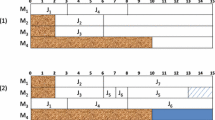Abstract
In this paper, we analyse the parallel machine makespan minimization problem with the general sum of processing time based learning or aging effects. First, we prove that an optimal solution to the single machine case can be found by priority rules. Next, for the considered parallel machine problem, we construct the exact dynamic programming algorithm that can operate on real-valued job processing times, which is the only exact algorithm for the analysed problem. The computational analysis confirms that it can solve optimally moderate problem instances.

Similar content being viewed by others
Notes
The algorithm DP-R was coded in C++ and simulations were run on PC, CPU Intel\(^{\circledR }\) Core\(^{\mathrm {TM}}\)i7-2600K 3.40 GHz and 8GB RAM.
References
Biskup, D.: Single-machine scheduling with learning considerations. Eur. J. Oper. Res. 115, 173–178 (1999)
Biskup, D.: A state-of-the-art review on scheduling with learning effects. Eur. J. Oper. Res. 188, 315–329 (2008)
Cheng, T.C.E., Kuo, W.H., Yang, D.Y.: Scheduling with a position-weighted learning effect. Optim. Lett. 8, 293–306 (2014)
Cheng, T.C.E., Lee, W.C., Wu, C.C.: Single-machine scheduling with deteriorating functions for job processing times. Appl. Math. Model. 34, 4171–4178 (2010)
Eren, T.: A note on minimizing maximum lateness in an \(m\)-machine scheduling problem with a learning effect. Appl. Math. Comput. 209, 186–190 (2009)
Gawiejnowicz, S.: A note on scheduling on a single processor with speed dependent on a number of executed jobs. Inf. Process. Lett. 57, 297–300 (1996)
Graham, R.L., Lawler, E.L., Lenstra, J.K., Rinnooy Kan, A.H.G.: Optimization and approximation in deterministic sequencing and scheduling: a survey. Ann. Discret. Math. 5, 287–326 (1979)
Hsu, C.J., Yang, D.L.: Unrelated parallel-machine scheduling with position-dependent deteriorating jobs and resource-dependent processing time. Optim. Lett. 8, 519–531 (2014)
Jaber, Y.M., Bonney, M.: The economic manufacture/order quantity (EMQ/EOQ) and the learning curve: past, present, and future. Int. J. Prod. Econ. 59, 93–102 (1999)
Jafari, A., Moslehi, G.: Scheduling linear deteriorating jobs to minimize the number of tardy jobs. J. Global Optim. 54, 389–404 (2012)
Janiak, A., Rudek, R.: A note on the learning effect in multi-agent optimization. Expert Syst. Appl. 38, 5974–5980 (2011)
Koulamas, C., Kyparisis, G.J.: Single-machine and two-machine flowshop scheduling with general learning functions. Eur. J. Oper. Res. 178, 402–407 (2007)
Kuo, W.H., Yang, D.L.: Minimizing the total completion time in a single-machine scheduling problem with a time-dependent learning effect. Eur. J. Oper. Res. 174, 1184–1190 (2006)
Lai, P.J., Lee, W.C.: Single-machine scheduling with general sum-of-processing-time-based and position-based learning effects. Omega 39, 467–471 (2011)
Lee, W.C.: Single-machine scheduling with past-sequence-dependent setup times and general effects of deterioration and learning. Optim. Lett. 8, 135–144 (2014)
Lee, W.C., Wu, C.C., Liu, H.C.: A note on single-machine makespan problem with general deteriorating function. Int. J. Adv. Manuf. Technol. 40, 1053–1056 (2009)
Mazdeh, M.M., Zaerpour, F., Zareei, A., Hajinezhad, A.: Parallel machines scheduling to minimize job tardiness and machine deteriorating cost with deteriorating jobs. Appl. Math. Model. 34, 1498–1510 (2010)
Mosheiov, G.: Parallel machine scheduling with a learning effect. J. Oper. Res. Soc. 52, 1–5 (2001)
Pei, J., Liu, X., Pardalos, P.M., Migdalas, A., Yang, S.: Serial-batching scheduling with time-dependent setup time and effects of deterioration and learning on a single-machine. J. Global Optim. doi:10.1007/s10898-015-0320-5 (2015, in press)
Pinedo, M.: Scheduling: Theory, Algorithms and Systems, 3rd edn. Prentice-Hall, Upper Saddle River, NJ (2008)
Rudek, R.: Some single-machine scheduling problems with the extended sum-of-processing-time based aging effect. Int. J. Adv. Manuf. Technol. 59, 299–309 (2012)
Wang, J.B., Wang, L.Y., Wang, D., Wang, X.Y.: Single-machine scheduling with a time-dependent deterioration. Int. J. Adv. Manuf. Technol. 43, 805–809 (2009)
Wang, J.B., Wang, X.Y., Sun, L.H., Sun, L.Y.: Scheduling jobs with truncated exponential learning functions. Optim. Lett. 7, 1857–1873 (2013)
Wanga, J.B., Wanga, D., Wang, L.Y., Lin, L., Yin, N., Wang, W.W.: Single machine scheduling with exponential time-dependent learning effect and past-sequence-dependent setup times. Comput. Math. Appl. 57, 9–16 (2009)
Wu, C.C., Lee, W.C.: A note on the total completion time problem in a permutation flowshop with a learning effect. Eur. J. Oper. Res. 192, 343–347 (2009)
Wu, C.C., Yin, Y., Cheng, S.R.: Some single-machine scheduling problems with a truncation learning effect. Comput. Ind. Eng. 60, 790–795 (2011)
Yang, D.L., Kuo, W.H.: Some scheduling problems with deteriorating jobs and learning effects. Comput. Ind. Eng. 58, 25–28 (2009)
Yang, S.J.: Unrelated parallel-machine scheduling with deterioration effects and deteriorating multi-maintenance activities for minimizing the total completion time. Appl. Math. Model. 37, 2995–3005 (2013)
Yin, Y., Xu, D., Sun, K., Li, H.: Some scheduling problems with general position-dependent and time-dependent learning effects. Inf. Sci. 179, 2416–2425 (2009)
Acknowledgements
We are grateful to the Editor and the Referees for their valuable comments on an earlier version of our paper.
Author information
Authors and Affiliations
Corresponding author
Additional information
The research presented in this paper has been supported by the Polish Ministry of Science and Higher Education under Iuventus Plus Programme (No. IP2014 040673).
Rights and permissions
About this article
Cite this article
Rudek, R. Parallel machine scheduling with general sum of processing time based models. J Glob Optim 68, 799–814 (2017). https://doi.org/10.1007/s10898-017-0509-x
Received:
Accepted:
Published:
Issue Date:
DOI: https://doi.org/10.1007/s10898-017-0509-x




